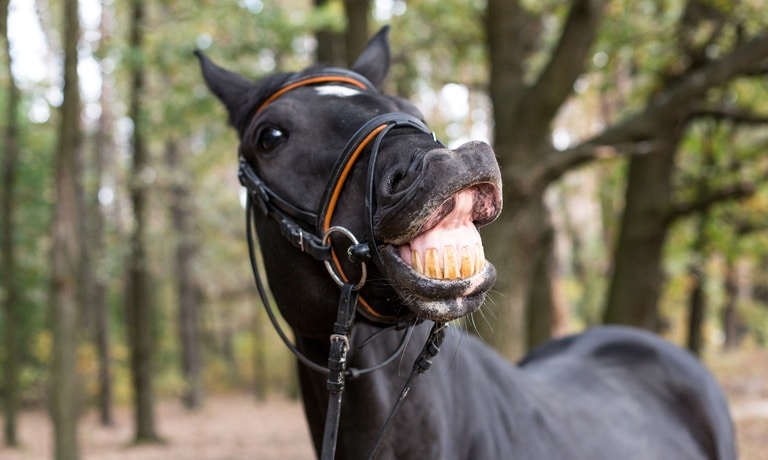
Equine dental health is one of the most overlooked aspects of horse care, yet it is vital for their overall well-being. Much like humans, horses rely on their teeth for essential functions like eating and even performance, making it critical to maintain their dental health at every stage of life. We’re taking a closer look at why horses need good dental health and how you can ensure yours has a happy, healthy smile.
Common Dental Issues in Horses
Horses experience unique dental challenges due to their continuously growing teeth, also known as hypsodont teeth. Over time, uneven wear can lead to a range of dental problems, such as sharp enamel points, hooks, ramps, and wave mouth. If left untreated, these conditions cause pain and may result in difficulties with chewing and weight loss.
Another common issue is retained deciduous (baby) teeth, particularly in younger horses, which create crowding and discomfort as permanent teeth grow in. Older horses are also at risk, especially for loose teeth or excessive wear that interferes with their ability to eat. Without good dental care, senior horses may struggle to maintain body weight and overall health.
Recognizing Signs of Dental Problems
Unlike humans, horses cannot tell you when they have a sore tooth. However, they often exhibit telltale signs of discomfort. Difficulty chewing, dropping feed, bad breath, or undigested feed in their manure are clear red flags. Behavioral changes, such as head tilting, resisting the bit, or avoiding bridling, also indicate oral pain.
The Role of Regular Dental Check-Ups
Routine dental care is not a luxury; it’s a necessity for horses. An equine dental professional detects issues before they escalate. Early intervention often prevents severe complications, including infections that could affect your horse’s overall health.
Experts recommend that adult horses receive dental check-ups every six to twelve months. For younger horses, more frequent evaluations may be necessary as their mouths develop, while senior horses likely require specialized care to address age-related concerns.
What To Expect During an Equine Dental Exam
A dental exam begins with a thorough inspection of your horse’s teeth, mouth, and gums. The veterinarian or equine dentist will usually use a full-mouth speculum to examine hard-to-see areas. They may also use tools to file down sharp enamel points or to remove problematic teeth.
How Dental Care Supports Overall Health
Proper dental care directly contributes to your horse’s overall well-being. Horses with healthy teeth are likely to maintain appropriate body weight, digest food effectively, and remain energetic. Dental health also affects comfort when using a bit, which can improve riding and training performance.
For senior horses, dental maintenance is particularly vital. Older horses are predisposed to dental wear and gum issues, which may make it challenging for them to process food. By addressing such issues, you will keep your senior horse in better health and improve their quality of life.
Dental care is a critical aspect of responsible horse ownership, but it’s often overlooked in favor of other health concerns. By prioritizing regular check-ups and staying alert to signs of dental problems, you can ensure your horse thrives at every stage of life. Give your horse a happy smile with good dental health and care.




